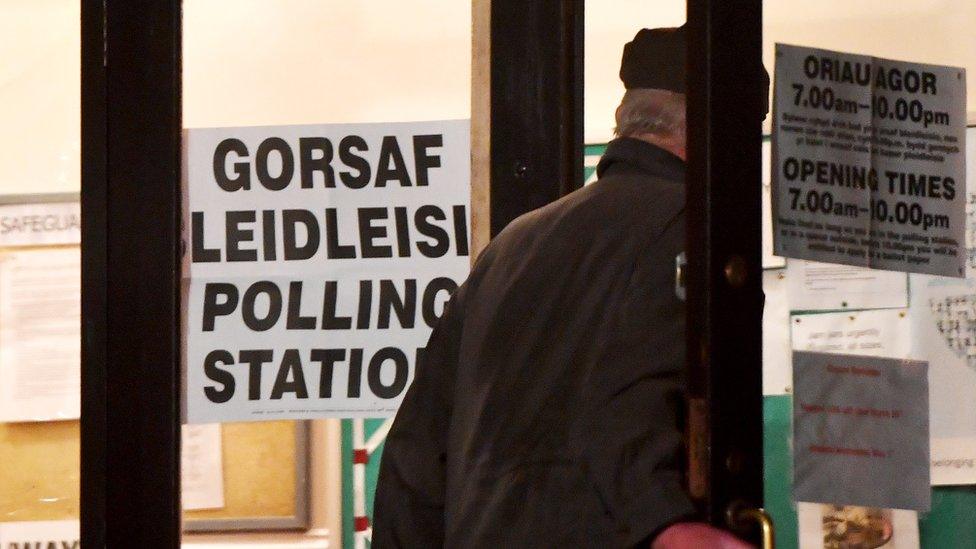Welsh government opposes voter ID at UK elections
- Published

In theory, if UK and Welsh elections took place on the same day, two sets of rules could apply
A new law that will require voters to produce identification at Westminster elections could cause confusion in Wales, the Welsh government has said.
UK ministers say the plans will boost transparency and protect democracy but Labour has claimed it will lock millions out of elections.
Now Welsh ministers are calling for the Senedd to vote against the bill, a move the Tories said was "mischief making".
The UK government said devolved nations could make other arrangements.
Under the proposals voters would have to present ID when they vote in Westminster elections and in elections for their police and crime commissioner.
It does not apply to elections to the Senedd or local government in Wales, which the Welsh parliament makes laws for.
In theory it could mean that, if any UK and Welsh elections took place on the same day, two sets of rules about how people take part would apply.
Other plans would remove the 15-year limit on overseas electors in UK general elections, ban party campaigners from handling postal votes, and stop people from "harvesting" postal votes by collecting them and handing in ballots from multiple different people.
It would also aim to protect candidates and campaigners from intimidation and abuse.
In a paper published on the Senedd website Counsel General Mick Antoniw wrote: "The Welsh government does not support the introduction of voter ID, the placing of unnecessary constraints on postal and proxy voting, or the extension of the overseas franchise."
The Welsh government's senior legal adviser wrote that he was concerned about "potential unintended consequences, such as voter and candidate confusion and complexity for administrators".
Parts of the bill, Mr Antoniw said, concern areas that the Senedd has powers to make law in and therefore it needs to be agreed by the Welsh Parliament.
But he suggested Senedd members reject the legislation, saying while he did see "the benefits of addressing for devolved elections some of the issues covered by this bill", he would prefer to have a Welsh bill instead.
No date is set for when the Senedd will vote on the elections bill - it must give consent to Westminster legislation that impacts its powers, although such votes do not prevent the laws from coming into force.

The voter ID rules would not apply to Senedd elections
UK Labour has alleged that the plans amounted to changing rules to "rig our democracy".
It claimed that it would make it harder for working class, older and black, Asian and minority ethnic people to vote.
The UK government has said voters who do not have a suitable identification would be able to get a voter card from their local council for free.
The move toward voter ID is a bid to prevent possible fraud from people pretending to be someone they are not at a voting station.
A report by the Electoral Commission in 2014 warned polling stations remained vulnerable to "personation fraud" because of the few checks available.
It noted ID checks are used in Northern Ireland and there was little evidence it had created barriers to voting there.
However critics say levels of polling station fraud are very low and the Electoral Reform Society has warned it could become a barrier to voting, and put people off.
Welsh Conservative shadow minister for the constitution Darren Millar said: "This is nothing more than mischief making from the Welsh government and its allies.
"Voters in Wales have nothing to fear from these proposals. The only people who should be concerned are those who intend to commit election fraud."
The UK Cabinet Office said: "Devolution means devolved governments in Wales, Scotland and Northern Ireland can make different arrangements.
"There are already areas of electoral law that differ - for example, the Scottish and Welsh governments already have different rules on who can vote in their elections."
It said it had been working to ensure changes were clear and practical for voters and electoral administrators, and would continue to do so.